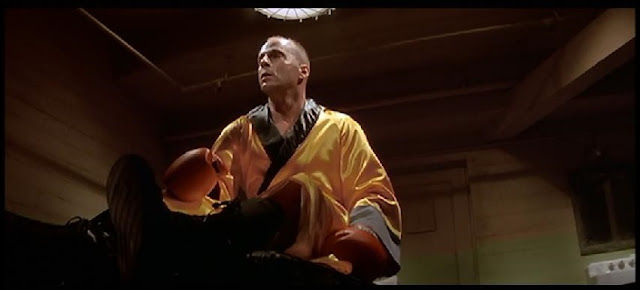Previously in the analysis, we have mentioned certain ideas which are alluded to in Pulp Fiction, such as meditation (recall that Butch's body position and robe color, when he is shown before his boxing match with Floyd Wilson, are reminiscent of those of someone who is meditating), and the idea that Jules is seeking enlightenment. In Buddhism, both meditation and deliberation are necessary to reach enlightenment.

Above left: Butch 'meditates'. Above right: Jules deliberates.
There exists a text on Buddhism that contains information which helps with the analysis, by way of enabling us to determine what the connection is between Butch and Jules. The text is volume 3 of Sopa's Steps on the Path to Enlightenment, and the material of interest is in chapter 14, which is titled, "The Perfections of Meditative Stabilization and Wisdom". In the below, the famous teacher teacher of Tibetan Buddhism, Je Tsongkhapa (1357-1419), is referred to:
"It is wisdom that destroys the mental afflictions and wisdom starts with study.
"Tsongkhapa [states that] wisdom is the vital life of the path to enlightenment, and that the most important first step for those who want to attain high spiritual goals is to listen to and study the teachings...[But] some people think that because a direct internal realization of the truth is gained through meditation, all this learning is unnecessary. They believe that meditation is non-conceptual, so all the details learned from study and analysis are useless for spiritual development. They say that the kind of wisdom gained from study is only for the purpose of teaching classes, arguing, or giving public presentations.
"This idea is still in circulation and continues to fool people. Those who want to achieve a superior goal must abandon this idea as if it were poison, because the opposite is actually the case; we need the analytical wisdom which arises from study and deliberation when we meditate. It is true that during direct yogic realization of śūnyatā all conceptual dualistic thought ceases, but this does not mean that throughout our entire practice we should abandon thoughtful analysis. There are certain places for certain things. Both analytical and stabilization meditation are necessary. Sometimes we need analytical wisdom and sometimes we need to fix the mind single-pointedly on an object...Without wisdom we would be practicing blindly without complete information. Only with wisdom can we make correct decisions regarding how to practice properly. To think otherwise is false."[a]
With the above in mind, we see that in a sense, Jules and Butch are 'complements' of each other - Jules deliberates, and, as described above, Butch is depicted in the film as meditating.
Earlier in this analysis, we observed that a kind of wisdom was imparted to the young Butch by Captain Koons, during his visit to Butch's home; we observed that this 'transfer' of wisdom (i.e., the wisdom of his patriarchal ancestors) was signified by Butch snatching the gold watch from Koons' hand. It is actually the case that the grabbing of the watch from Koons' hand marks the initiation of Butch's process of acquiring wisdom. Then, over the period of time between this point in Butch's life, and that when his flashback to Koons' visit ends, Butch acquires enough wisdom so that upon his awakening from the flashback, which marks the point in time at which he attains enlightenment, he is an already wise person.
a. Sopa, Geshe Lhundub and Beth Newman. Steps on the Path to Enlightenment, A Commentary on Tsonghkapa's Lamrim Chenmo, Vol. 3: The Way of the Bodhisattva. Boston: Wisdom Publications, 2008. Google Books, pp. 526-527. URL = https://books.google.com.

